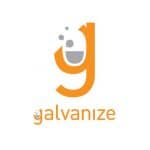
Galvanize
Galvanize Overview and Guide
If you want to study data science or software engineering, Galvanize may be a good option for you. In this Galvanize review, we cover what programs it offers, how much it costs, how to finance your education, and how to get started at one of the school’s nine campuses, located in major cities around the United States.
Google, IBM, Amazon, and Tesla have all hired Galvanize graduates. Read on to find out how Galvanize can help you acquire a practical skillset and compete for lucrative jobs.
What You Need to Know About Galvanize
Galvanize is a tech skills bootcamp with 13-week full-time programs and 30-week or 36-week part-time programs. The school offers top-notch training in data science, software development, and professional development in nine American cities and on its online platform. Galvanize also organizes events and workshops for corporate training.
- Cost: Full-Time and Part-Time: $17,980, Data Science Prep: $495, Software Engineering Prep: $250
- Schedules: Full-Time, Part-Time
- Courses Offered: Data Science, Software Engineering, Professional Development
- Upcoming Start Dates: Varies by course and location
Galvanize Curricula: What Can You Study?
Every Galvanize course comes in both on-campus and remote formats. The project-based content of each program is geared toward developing real-world, professional skills. Below is an overview of what each of the school’s three main offerings consists of.
Data Science
The Galvanize data science immersive program guarantees extensive training in Hadoop, SQL, and the data applications of Python. To get in, you must first display your knowledge of Python programming, statistics, and math in two technical interviews.
Prospective students also have the option to pay $495 for a premium prep course, which can get them up to speed and prepare them for the technical interviews. Once accepted into the data science bootcamp, the $495 will count toward their tuition.
But if you’re feeling unsure about becoming a data scientist, you can start with Galvanize’s Python Fundamentals course, which is part-time and beginner-friendly.
Software Engineering
Galvanize isn’t all about data science. The school also has a coding bootcamp. In the software engineering immersive program, you’ll learn AngularJS, Express.js, and Node.js. Before applying, students should have a basic foundation in CSS, HTML, and JavaScript, the core languages in front end web development.
During the technical interview, applicants must complete coding challenges. To calm your nerves and increase your chances of getting in, try the premium software engineering prep course for $250.
Professional Development
This part-time program was created to turn software engineers into project managers and industry leaders. It consists of several six-week courses to help learners stay informed on recent developments and learn best coding practices. Options include networking, machine learning, computer architecture, algorithms, data visualization, and more.
Galvanize Campuses: Where Can You Study?
All Galvanize courses are available onsite and online. In-person classes have benefits such as personalized education, live practices, and collaborative tasks. Online courses can be taken from anywhere. Below is a full list of Galvanize locations.
- Austin
- Boulder
- Denver
- Los Angeles
- New York
- Phoenix
- San Francisco
- San Jose
- Seattle
- Online
Galvanize Schedules: When Can You Study?
Full-Time
Full-time courses are the perfect option if you want to obtain a certificate in a short period of time. Galvanize’s full-time programs last 13 weeks, with a time commitment of 40 hours per week. Both the online and onsite versions of its immersive bootcamps are full-time.
Part-Time
If you’re busy working or studying, you can take a part-time course in data science or software engineering with Galvanize. Classes are remote but conducted in a live environment with teachers and other students, so you can still collaborate with your peers. The program length is 30 weeks for data science, and 36 weeks for software engineering.
Galvanize Tuition
The cost of tuition is one of the most important things to consider when choosing a bootcamp. Galvanize’s data science and software engineering programs cost $17,980, which is cheaper than a bachelor’s in data science or computer science. To help you cover the cost, Galvanize provides a few different financing methods.
Galvanize Financing and Payment Options
- Upfront or Split Payment. The cleanest method is to pay the full cost upfront. But if you can’t afford to do that, you may be able to get it done in two payments, one at the start of your course and the other at the midpoint.
- Loans. If you do not have money to pay for the course, you can access financing from Climb Credit or Skills Fund, Galvanize’s two lending partners. To request these options, you only have to fill out a five-minute form.
- Income share agreement (ISA). If you choose this option, you can make a $2,000 deposit now and pay the rest after you get a job that pays a minimum salary of $60,000. The ISA requires 10 percent of your salary for 48 months.
- Military benefits. If you are a veteran, you can apply GI Bill benefits or VET TEC funds toward your tuition. These benefits are available for all online and on-campus courses.
- Scholarships. Galvanize features special grants for underrepresented groups in the tech industry. Five Black students per cohort are awarded the We Stand Together Scholarship, and all underrepresented groups are encouraged to apply for a single Galvanize Scholarship.
Galvanize Admissions: How to Get In
One thing to keep in mind is that Galvanize only admits students with professional goals and previous experience in data science or software engineering. Once you’re ready to apply, go to the website, research all your options, and start filling out the application form.
Galvanize Application
The admissions process at Galvanize is similar for software engineering, data science, and all other courses. Below are the three required steps.
- Register. Go to the official website, choose the course you want to take, and then sign up. You must include personal and professional information.
- Complete a challenge. The next step will be to complete a challenge related to the course you chose. These tests are designed to evaluate your ability to work under pressure.
You can take these tests up to three times. When you pass your challenge, a Galvanize advisor will call you within three days to schedule the technical interview. - Take a technical assessment. During the 75-minute technical evaluation, a Galvanize expert will administer a test over Zoom. The content of your test will be based on your desired course, and it will conclude with a round of questions and answers. Within three days, you will get a call letting you know if you passed.
Galvanize Interview
In addition to the technical assessment, you will be asked about your background and goals. You will explain your reasons for choosing Galvanize, your professional aspirations, and your prior experience with the subject matter of your selected course.
Galvanize Admission Rate: What Are My Chances of Getting In?
For now, the exact Galvanize acceptance rate is confidential. Your personal characteristics and your performance on the admissions tests will determine whether you get in.
Galvanize Outcomes: Will I Find a Job?
About 94 percent of Galvanize graduates find jobs quickly. The bootcamp has placed its graduates at more than 2,000 companies since its inception, including Twitch, Google, Amazon, IBM, Salesforce, and Tesla. The average salary for graduates of its data science program is about $95,000.
Job Placement Services at Galvanize
Career services are what separates great bootcamps from the merely good. During your time at Galvanize, you will work on your portfolio and learn how big companies make hiring decisions. You will receive guidance on personal branding, networking, and job searching, including how to craft a resume and how to answer common interview questions.
Should You Apply to Galvanize?
If you are looking for a great experience learning data science or software engineering, then you should apply to Galvanize. During your course, you will learn everything you need to succeed in the tech industry. Before applying to Galvanize, you should consider the four things below.
- Rigorous learning environment. The courses are very demanding. Make sure you’re fully committed to a career in tech before applying.
- Mandatory prep courses. You must complete prep courses before your first day at a Galvanize immersive bootcamp. You will learn about coding basics or data science fundamentals.
- Grueling admissions process. You can only take the technical assessment three times, and Galvanize requires all students to have previous experience. Therefore, don’t take it personally if you don’t get in on the first try.
- Bootcamp partnership. Galvanize partners with Hack Reactor, a coding bootcamp based in San Francisco. This means that the certificate you earn when you graduate could have a double stamp of approval.
The demand for tech talent is nonstop, and Galvanize is here to help close the skills gap. It won’t be an easy ride if you get in, but for a faster and cheaper course of study than a college degree, an excellent education in data or software, and a chance at a great job, you should give Galvanize a second look.


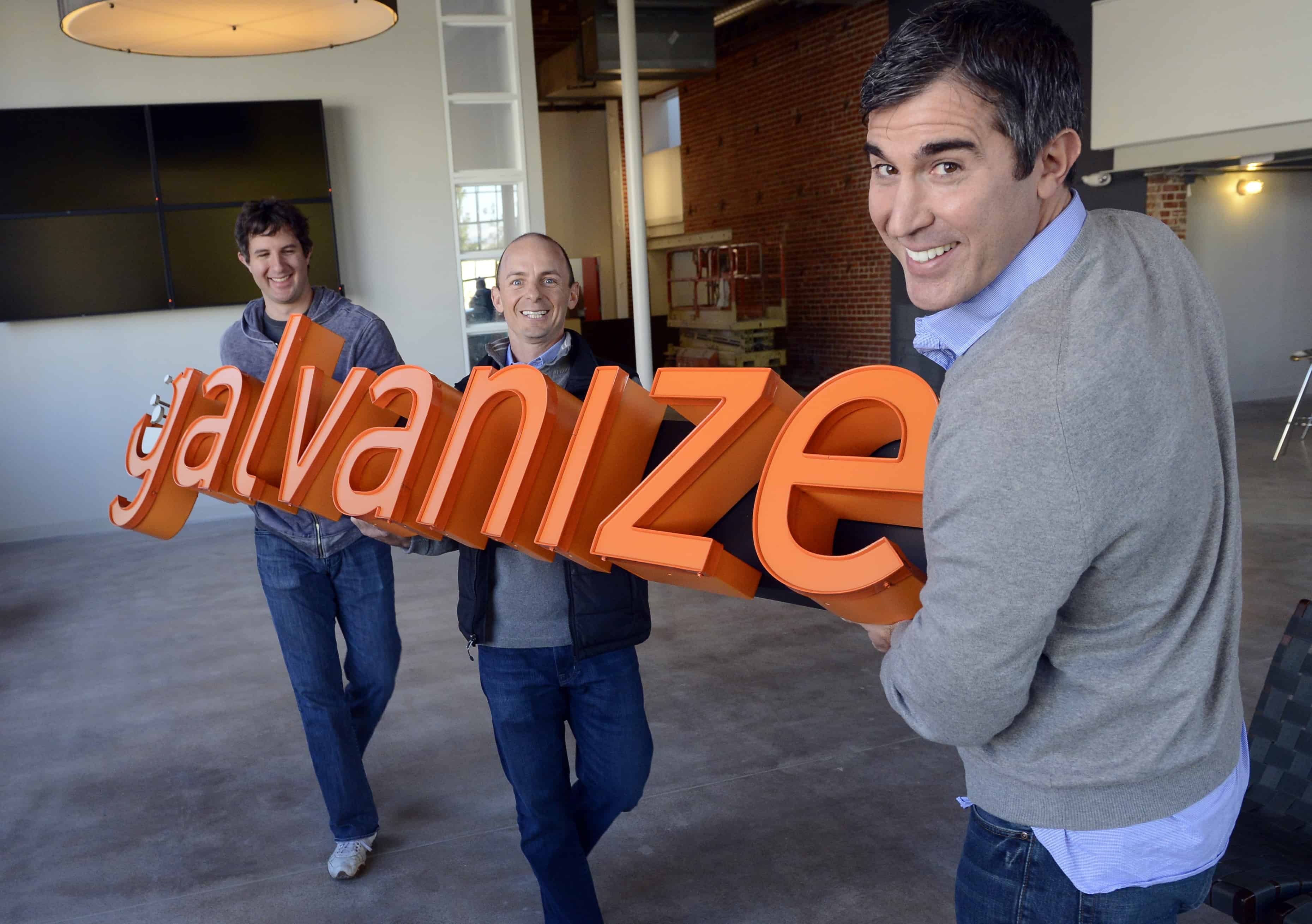

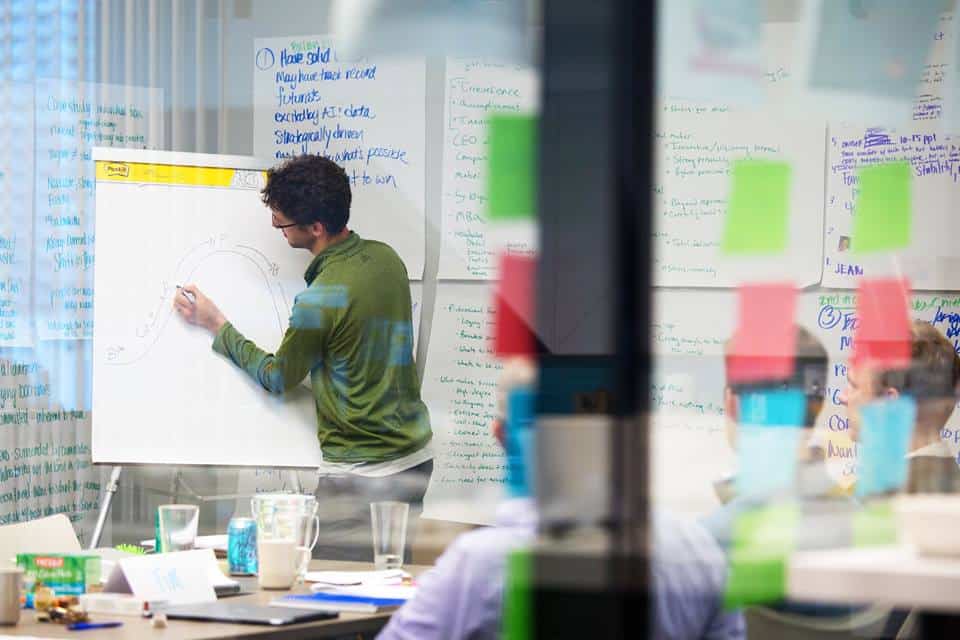
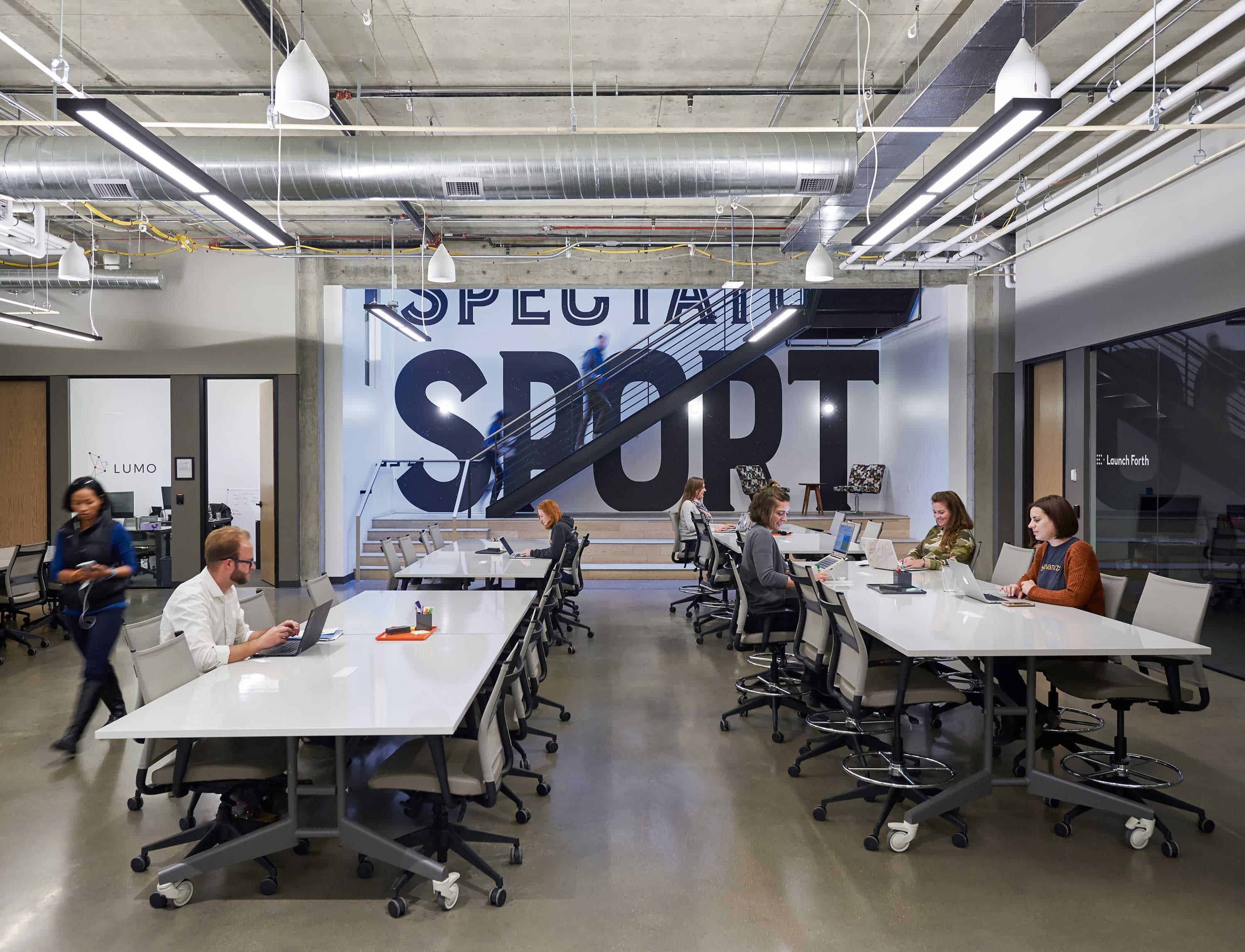
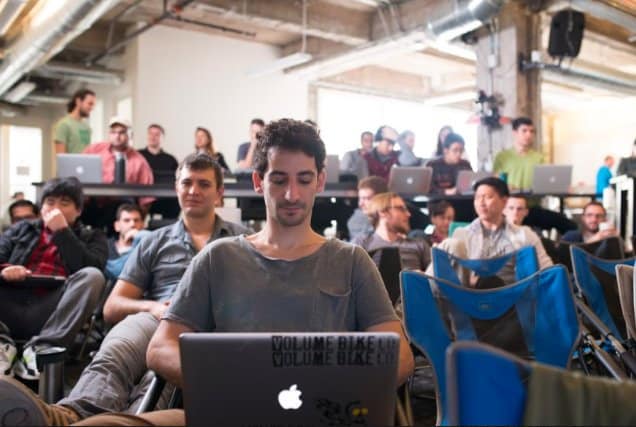
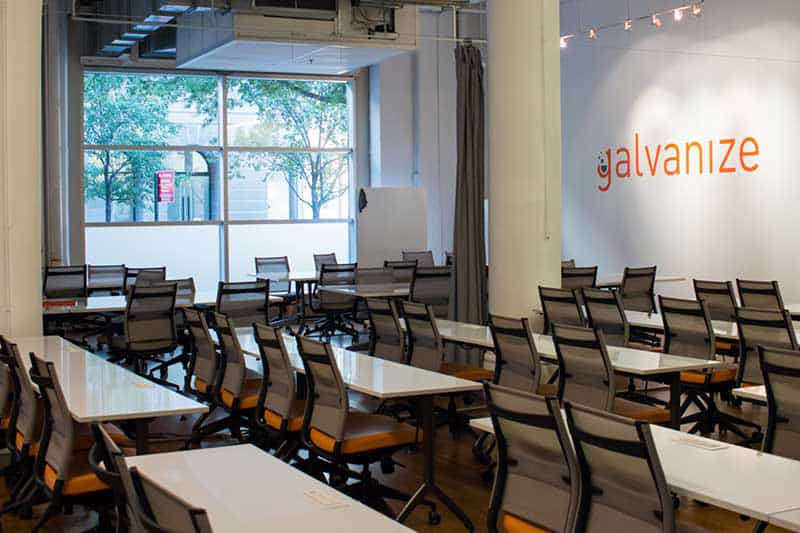
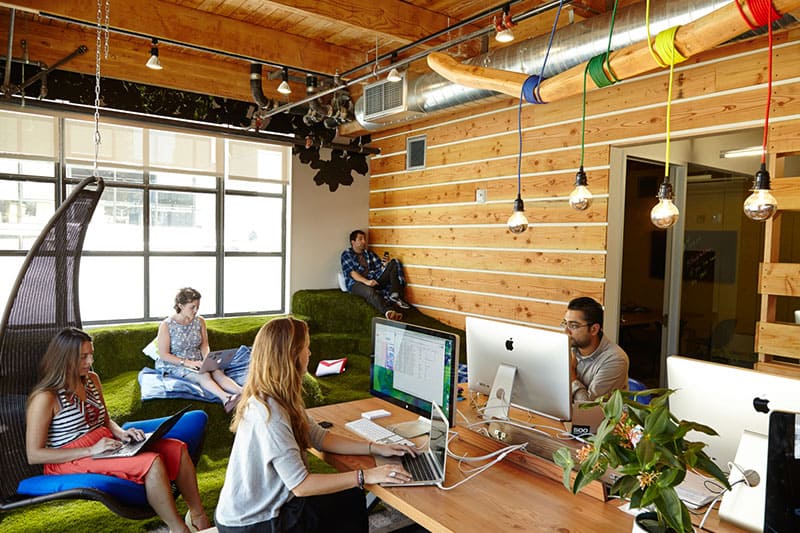
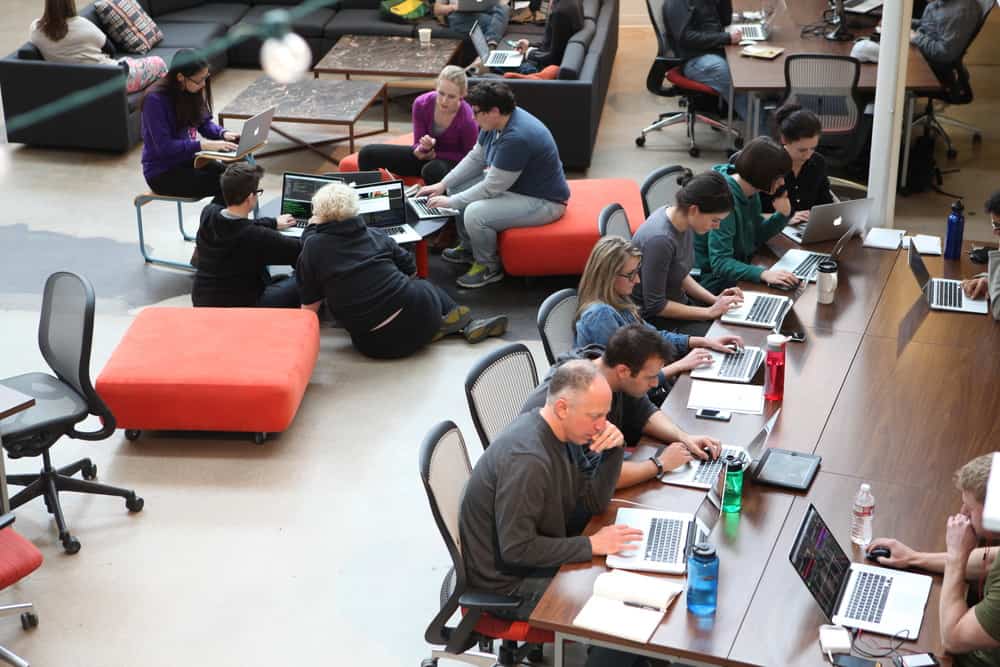
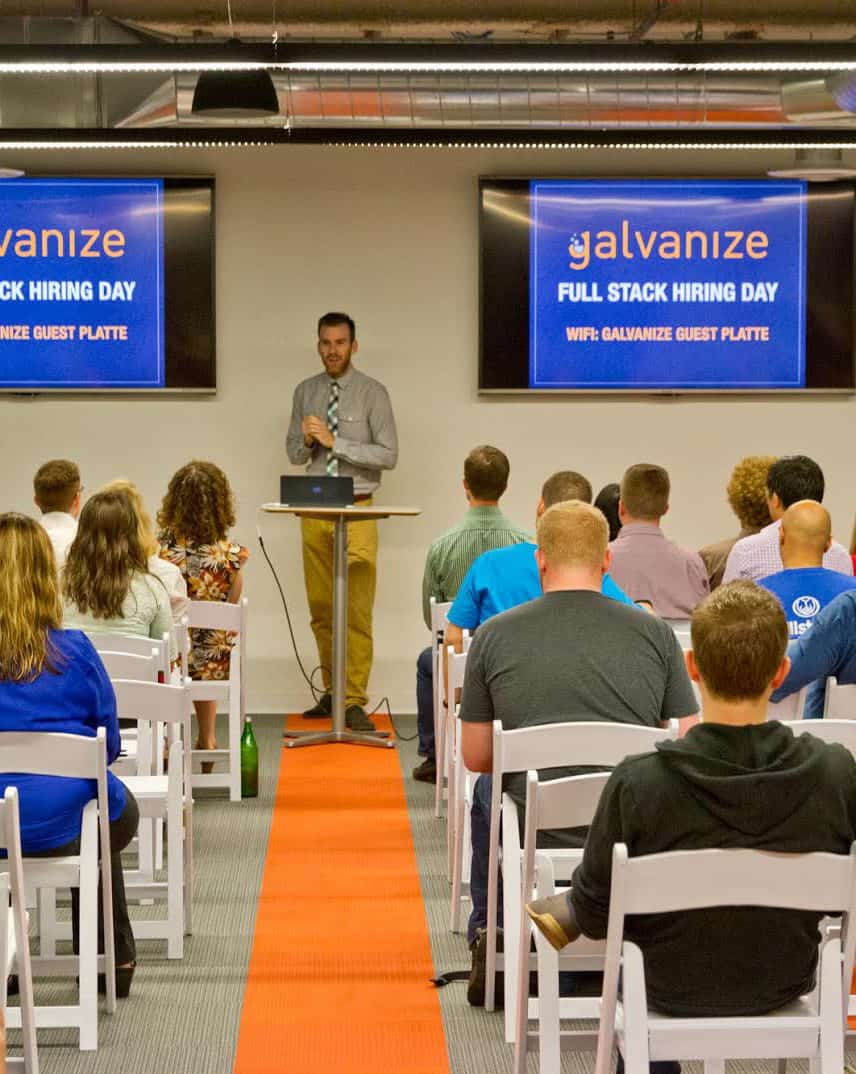
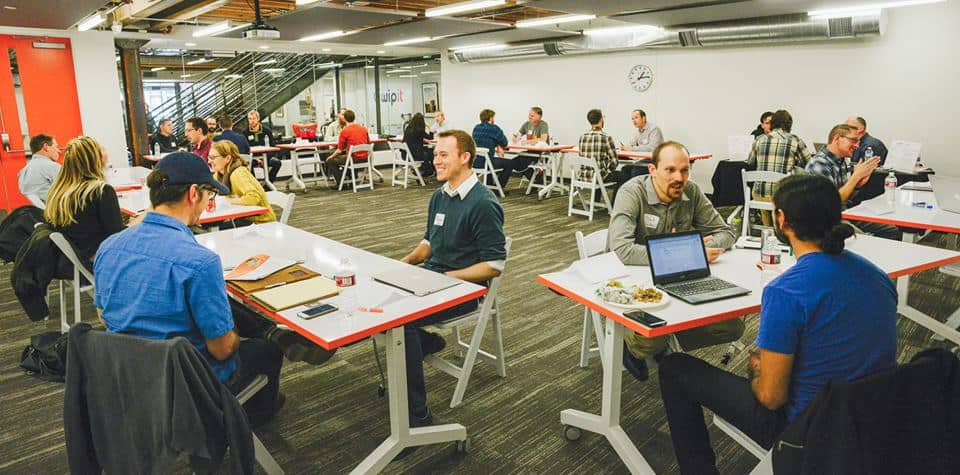






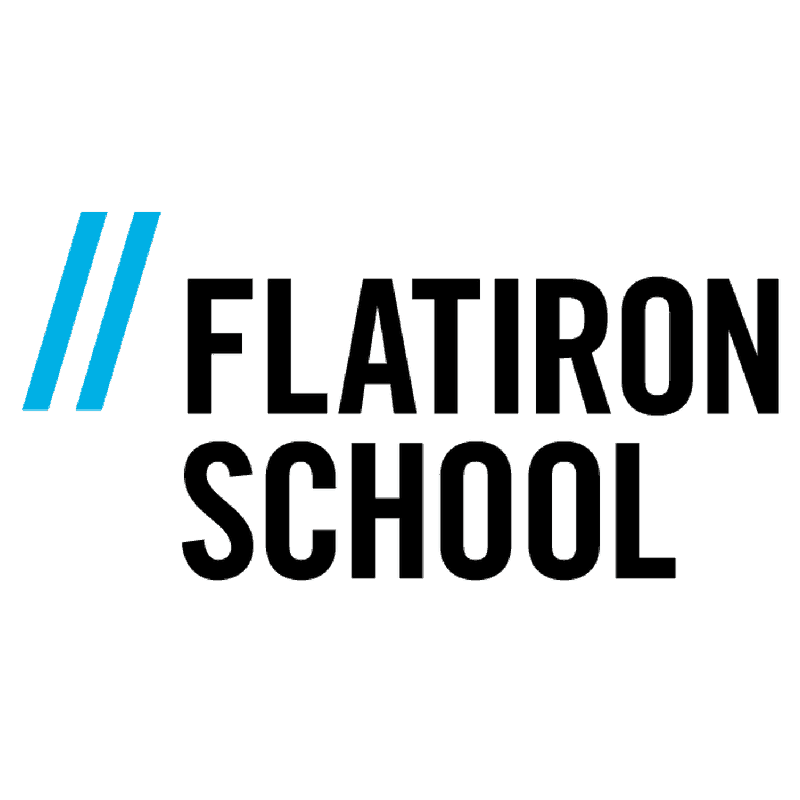

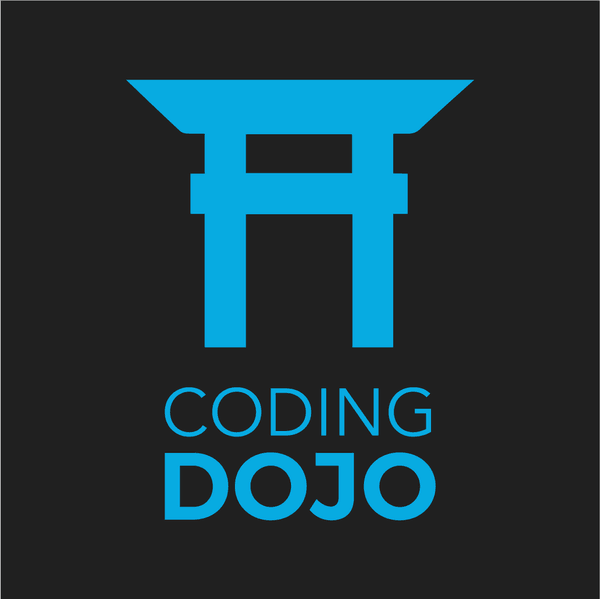



Anonymous
Intro
I used to work as a principal software engineer at a big software company for many years doing full stack Java web development. I wanted a new job but everything in web development has changed from Java/php/Ruby to JavaScript frameworks. I looked at a few bootcamps in the (Coding Dojo, Hack Reactor, Dev Mountain and Dev League in Hawaii – nice but no time to surf) and was accepted by them all. They are all good schools but Galvanize was 6 months (24 weeks), not 3 months to help us learn more and one of their instructor Josh used to teach at Hack Reactor and gave us a free Saturday course in JavaScript.
Precourse
I was accepted at all the schools. Hack Reactor had a one month prep course, other schools were easier to get in and Galvanize had an online test with an instructor, Oli. Josh gave me some last minute tips and I passed with flying colors but I would recommend people learn JavaScript first. They also like us to have a pre course project making a web page. I reached out to a few grads who helped me with Galvanize.
Quarters
The course was taught by Nestor and the resident was Michael (a recent graduate). Both were very knowledgeable in the materials.
The first quarter was web (HTML, CSS) and JavaScript. We created an image scraper JavaScript web application. Each quarter we get about one week to work on a final project and etween quarters we get a break week.
Second quarter was on React. This was the first cohort to learn React in the second quarter and probably the first to really deep dive on Redux, Think middleware and JS testing! We all made React web and React Native mobile apps projects for second quarter!
Third quarter was on Node and database development with the project to be integrated with our React projects to be hosted on AWS (Amazon Web Services). We all worked together and got everything done right before the Thanksgiving holiday break week.
Fourth quarter was our final project (3 weeks) and prep work, CS concepts for interviews. I worked on a React Native mobile app and our cohort had the most diverse set of applications throughout the program (5 mobile apps, e-commerce apps, video game for 2 players) and technologies (React, React Native, GraphQL, Python, Socket IO, and many more)! The limited amount of time the students had (1 to 3 weeks) to build full stack applications was truly amazing and inspirational!
As for career services, James encouraged us to go to informational interviews (I met with 18 tech professionals and wrote a blog about it http://siliconvalleycoffeetalk.blogspot.com/2018/03/interested-in-silicon-valley-coffee-talk.html), set us up to interview with many companies and even had follow up interview preps to help us months after graduation. This was free to graduates and we also get six months access to Galvanize workspace and lifetime use of the Alumni lounge.
After graduation, there weren’t that many companies hiring and I went to Galvanize interview prep with help from their director Sherif. He gave me a few pointers which I tried at an interview and it got me an offer from a start-up. Overall I received multiple offers two months after graduation, had interviews with big companies (had to cancel a few due to the job offers) such as Apple, Sony PlayStation, Microsoft, LinkedIn, Netflix, Amazon, IBM and many more.
Thank you Galvanize. Even though I graduated and got a job, I still go there to help with the new students and go to meet ups as it encouraged me to pay it forward with people new to tech. I highly recommend this school!
May 16, 2020
Anonymous
My overall experience with the Galvanize data science immersive was very positive and something I would recommend to others. I felt like I was always supported throughout the program by staff (technically, and career-wise), the curriculum was well developed, pacing was ambitious, but not too fast, and ultimately left feeling well prepared for my career.
Pro’s:
– Diverse curriculum, with room for flexibility at the instructors discretion
– Well educated and credentialed instructors
– Great facility
– length of course
– Good preparation for career hunting (mock interviews, content testing, etc.)
Con’s
– Cost
– Lack of depth in learning concepts (mostly due to time constraints however)
June 8, 2020
Anonymous
I recently (end of 2018) graduated from the web development immersion program (I think they are changing the name toward – software engineering program) at the Galvanize Platte location. It was a 6-month intensive program which is changing! It will be a 3-months intensive next year. I learned a ton through the program and acquired some pretty incredible skills, but I had to work my ass off in order to be successful at the program. The time required to be on campus is from 9:00am to 5:00pm (although, class usually ended 45 minutes early everyday). However, I was there usually from 7:00am to 6:30 or 7:00pm. I spent so much time at campus because Galvanize preaches a “learn to learn” pedagogical philosophy that expects YOU to do all the leg work in learning the material and only will provide the instructor support to help you along the way. This is important for the very reason that it gives you the skills to learn all of this stuff on your own. However, when you pay the high tuition, one expects (as I did) to be taught how to code which wasn’t my experience at Galvanize. I often wondered if the “learn-to-learn” philosophy that was constantly preached was leaned on too much by the Galvanize staff as a way to make up for the short fall in instructor support during the learning process. Galvanize does not have a conventional teaching model. I want to emphasize that you teach yourself. That being said, there are some incredible instructors at Galvanize Platte. I became close with several of them, who were always available to help when I couldn’t figure something out. Their desire and eagerness to help students learn is certainly evident. They want you to succeed and will work hard to help you if you work hard to do so. So, keep in mind that Galvanize is an atypical learning experience. If you choose to do this program, know that you do so as an adult who has that power and ability to work hard to obtain what you want – this experience is the epitome of “you get what you put in.” I also was in a great cohort and made several new great friends. The community at Galvanize is awesome. The school’s career services folks (there are two of them that work with students directly) are great! They are both incredible people with incredible talent for creating successful job candidates out of the students. However, again emphasis added, you must do the work. All in all, I thought Galvanize Platte was a great experience but it was the hardest I have ever had to work to learn something new, and the experience paid off multifold and will continue to do so. If you are not willing to put in the time, then I wouldn’t recommend this program, there are cheaper and easier alternatives out there. However, if you are willing to put in the work, this experience will be worth the money invested into it.
July 10, 2020
Anonymous
Galvanize’s (Denver-Platte) WDI program exceeded my expectations. I joined the 6-month immersive totally new to the field, and the program and it’s astounding staff took me from the ground up. The curriculum is top notch, and instructors do a phenomenal job of guiding you along the way while teaching you to be independent and job-ready. Being in a co-working space, students have the unique opportunity to network with companies of all sizes and background. In addition, the career services team is an exceptional asset to the program, as they give you personal feedback on your resume/cover letters/etc. to be job search ready. Thanks to their help and the modern curriculum, I accepted a job offer less than a month after graduation! This program is tough, but anyone willing to work hard will be successful.
September 16, 2020
Anonymous
Pros:
-Felt like they had a good grasp of the relevant technologies that need to be learned.
-Excellent Career Services: I worked largely with Chris Hegg and some with Angela Hayes. They help you with your resume, cover letters, interviewing, salary negotiation, application process and all the associated and latest tools to help with these things.
-It was very challenging, which is good because it prepared me for the future challenge that is being a junior developer. Plus, it just pushed me to be better in all areas of my life. Because it was so hard, I had to become more disciplined, more focused, and better with time-management.
Cons:
-Very disorganized: we keep moving classrooms, experienced large curriculum changes, and I think missed out on learning some things due to a shortage of instructors. My cohort came in just as two lead instructors and curriculum developers were heading out. So, perhaps the disorganization was something merely acute and not a chronic symptom.
-It was difficult to get one-on-one help at times
-It felt very high-school-ish, clique-ish, and I think some of the instructors participated in this
-Some of the instructors were not very professional
October 19, 2020